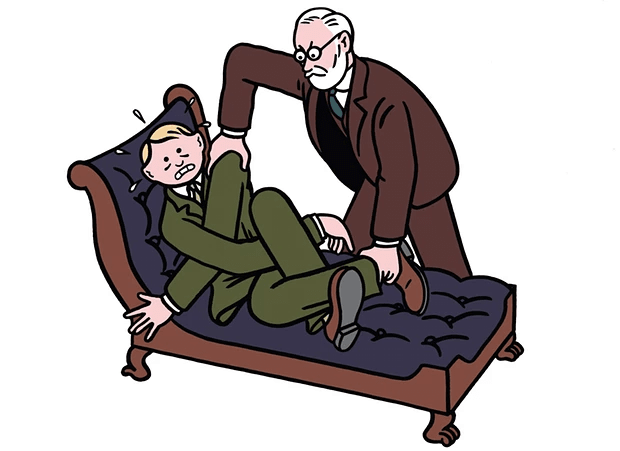
While psychoanalysis has been an important part of the intellectual toolbox of art and the humanities for decades now, around the mid-twentieth century it began to disappear from therapists’ offices, replaced by a new, “empirically based” form of therapy called cognitive behavioral therapy (CBT). It seems, however, that psychoanalysis is making a comeback, as CBT is proving itself to be a superficial, short-term fix to psychic ailments, and utterly useless for understanding how humans actually work. Oliver Burkeman has the story in an excellent longread for The Guardian. Here’s a snippet:
Yet rumblings of dissent from the vanquished psychoanalytic old guard have never quite gone away. At their core is a fundamental disagreement about human nature – about why we suffer, and how, if ever, we can hope to find peace of mind. CBT embodies a very specific view of painful emotions: that they’re primarily something to be eliminated, or failing that, made tolerable. A condition such as depression, then, is a bit like a cancerous tumour: sure, it might be useful to figure out where it came from – but it’s far more important to get rid of it. CBT doesn’t exactly claim that happiness is easy, but it does imply that it’s relatively simple: your distress is caused by your irrational beliefs, and it’s within your power to seize hold of those beliefs and change them.
Psychoanalysts contend that things are much more complicated. For one thing, psychological pain needs first not to be eliminated, but understood. From this perspective, depression is less like a tumour and more like a stabbing pain in your abdomen: it’s telling you something, and you need to find out what. (No responsible GP would just pump you with painkillers and send you home.) And happiness – if such a thing is even achievable – is a much murkier matter. We don’t really know our own minds, and we often have powerful motives for keeping things that way. We see life through the lens of our earliest relationships, though we usually don’t realise it; we want contradictory things; and change is slow and hard. Our conscious minds are tiny iceberg-tips on the dark ocean of the unconscious – and you can’t truly explore that ocean by means of CBT’s simple, standardised, science-tested steps.
This viewpoint has much romantic appeal. But the analysts’ arguments fell on deaf ears so long as experiment after experiment seemed to confirm the superiority of CBT – which helps explain the shocked response to a study, published last May, that seemed to show CBT getting less and less effective, as a treatment for depression, over time.
Examining scores of earlier experimental trials, two researchers from Norway concluded that its effect size – a technical measure of its usefulness – had fallen by half since 1977. (In the unlikely event that this trend were to persist, it could be entirely useless in a few decades.) Had CBT somehow benefited from a kind of placebo effect all along, effective only so long as people believed it was a miracle cure?